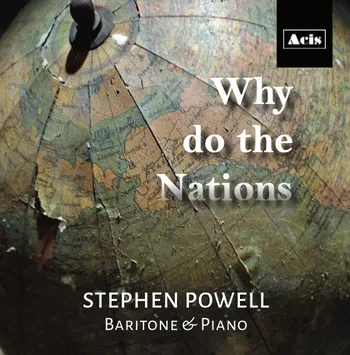Songs by Puccini, Ravel, Falla, Wolf, Rachmaninov, Zhao Yuanren, Britten, Verdi, Barber, Strauss, Fauré, Rentaro Taki, Obradors, Head, Schubert, Dong Jin Kim, Copland, Emile Paladihe, Tchaikovsky, Brahms, Cladio Santoro, Montsalvatge, Ives.
Stephen Powell Baritone and Piano
Acis APL51200
Full Price

The Review
The title, familiar from Handel’s Messiah, continues of course. Why do all the nations rage so furiously together? And that is the point. Stephen Powell’s tour du monde is a gesture of defiance against international conflict, a celebration of the riches of art song, wherever one calls home.
Powell’s selection is inevitably a personal box of goodies and some of the songs (Schubert’s The Trout, Rachmaninov’s Spring Waters, Britten’s Every Night And Every Morn, for example) are thoroughly familiar. One would not pick Powell’s performance for any of these in isolation but that is not the intention. This is a recital to dispel gloom and he does so with vim.
I will concentrate on the less well-known composers’ contributions. How Can I Not Think Of Her, by China’s Zhao Yuanren, was written in 1926 and is a typical landscape and love song, strophic and almost a carol. Zhao was 90 when he died in 1982, having lived through changes in his country which must have felt increasingly baffling. This is a song of simplicity and refuge in nature. Following with Britten’s The Brisk Young Widow (in Chester Town) is inspired. It is also a nice performance pun because Powell lives in Chester County, Pennsylvania, not Chester, Cheshire. He follows the logic of the lyrics to decide on the order of the songs (although this order is not followed in the liner notes, inconveniently). Verdi’s La Seduzione comes next and is then blown apart by Barber’s I Hear An Army. The Japanese composer, Rentaro Taki’s 1901 song Moon Over The Ruined Castle laments passing glories after Fauré’s Mandoline, a jaunty delicate number that feels a bit high for Powell’s natural range. Perhaps it would not if he was standing rather than sitting at the piano, concentrating on Fauré’s tricky accompaniment.
This brings us to the nub of the issue. Powell is as good a pianist as he is a singer but I’m not sure he should do both at the same time – or were the piano and vocal tracks recorded separately and was he standing to sing? It doesn’t sound like it. There are moments which remind me of Richard Rodney Bennett accompanying himself live, the voice and lyrics being dominant, the piano part more of a commentary than an equal partner. With him, the effect could be magical but it could also, around one in the morning, seem perfunctory and here the self accompaniment does not always quite come off. Oddly, there is not the unity one gets from a really good accompanist listening closely and responding. This is a good case of two heads being better than one.
That said, there are so many minor jewels in the recital that the quibbles can be overlooked happily. Where else would one find Gagopa (I Want To Go Back) by Korea’s Dong Jin Kim nestling up against Copland’s Zion’s Walls, written during the Korean war – followed by Emile Paladhile’s (not a composer I’ve ever come across before) sentimental but charming Petits Enfants?
Powell finishes with Ives’s Majority, his sarcastic take on the delusions of democratic masses, a text riddled with irony that could apply just as well to 2021 pandemic, Trumpian, America as it did to that post war country a hundred years earlier. This is an album that is brilliantly programmed and well enough sung and played for minor imperfections not to intrude. Something of a collector’s item, I suspect.
SM
